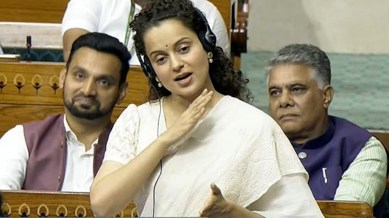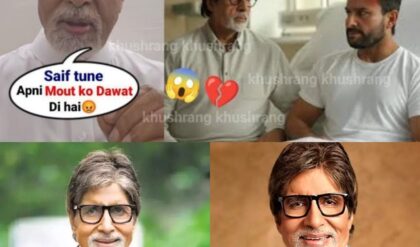Kangana Ranaut vs. Nirmala Sitharaman: The War of Words Amid Parliament Sessions
The ongoing political discourse in India often sees unexpected and dramatic moments. One such instance unfolded recently when Bollywood actress Kangana Ranaut and Finance Minister Nirmala Sitharaman found themselves embroiled in a public war of words during Parliament sessions. What began as a subtle remark soon escalated into a heated debate, catching media attention and sparking discussions about celebrity involvement in politics and governance.
This article delves into the origin, escalation, and broader implications of this clash.

The Genesis of the Conflict
The conflict traces its roots to Kangana Ranaut’s commentary on the Indian economy and government policies. Known for her outspoken nature, Ranaut had previously voiced opinions on a variety of socio-political issues. This time, she took to social media to critique the government’s fiscal policies, particularly targeting Sitharaman’s handling of the economy.
Ranaut’s remarks, which included calling the policies “regressive” and claiming they were detrimental to the common man, drew sharp reactions. Her comment, “A government that complicates the lives of its citizens in the name of reforms cannot truly serve its people,” was seen as a direct challenge to Sitharaman’s leadership.
In response, Sitharaman, during a Parliament session, subtly addressed Ranaut’s remarks without naming her. She emphasized the importance of understanding macroeconomic complexities before making public statements, saying, “Critique is welcome, but it should be informed and constructive. Populist statements may grab headlines but fail to reflect the ground realities.”
The Escalation
Kangana Ranaut, never one to back down, responded swiftly. She released a video on her social media platforms, doubling down on her criticisms. “I am not an economist, but as a citizen, I have the right to question policies that affect me and millions like me. Mocking my lack of expertise does not negate the issues at hand,” she asserted.
Ranaut’s remarks received mixed reactions. While some lauded her for questioning those in power, others criticized her for oversimplifying complex issues. Social media quickly became a battleground, with hashtags like #KanganaVsSitharaman trending nationwide.
Meanwhile, Sitharaman maintained her stance in Parliament, emphasizing the government’s commitment to reforms. She highlighted measures such as the Railways Amendment Bill 2024, which aimed to streamline bureaucratic processes and enhance accessibility for the common man—a direct counterpoint to Ranaut’s claim of “regressive” governance.
The Media Frenzy

As the verbal sparring continued, media outlets eagerly picked up the story, framing it as a clash between a fiery Bollywood actress and a seasoned politician. News channels and publications debated whether celebrities like Ranaut should critique governance or stick to their domains of expertise.
Opinion pieces were split. Some commentators saw Ranaut’s involvement as a healthy sign of democracy, where citizens, irrespective of their profession, could hold the government accountable. Others dismissed her critiques as uninformed and self-serving, aimed at garnering attention rather than driving meaningful change.
Parliamentary Relevance
The timing of this feud coincided with significant parliamentary sessions discussing landmark bills, including the Railways Amendment Bill 2024. Proposed by Railways Minister Ashwini Vaishnaw, the bill sought to simplify railway regulations by merging outdated laws, such as the 1905 Railway Board Act, with the 1989 Railway Act. The government hailed this as a step toward reducing bureaucratic hurdles and making services more citizen-friendly.
However, Ranaut’s critiques indirectly questioned the effectiveness of such reforms, arguing that they often fail to address grassroots issues. While Sitharaman defended the government’s broader economic agenda, the clash inadvertently brought more public attention to the bills under discussion.
Broader Implications
1. Celebrity Involvement in Politics: This episode reignited the debate over whether celebrities should engage in political discourse. While their influence can amplify critical issues, the lack of expertise often undermines their arguments.
2. Democracy and Dissent: The incident underscored the importance of dissent in a democracy. Whether or not one agrees with Ranaut’s approach, her ability to question governance reflects the democratic right to free speech.
3. Perception vs. Policy: The war of words highlighted the gap between public perception and policy realities. Ranaut’s simplified critique resonated with many who feel disconnected from high-level policy discussions, while Sitharaman’s detailed defense aimed to bridge this gap.
What Lies Ahead?
The Kangana Ranaut vs. Nirmala Sitharaman feud raises critical questions about the intersection of politics, celebrity influence, and public discourse. As the nation gears up for future parliamentary sessions and elections, the role of outspoken figures like Ranaut in shaping political narratives cannot be ignored.
For the government, the challenge lies in effectively communicating its policies to the masses while addressing genuine grievances. For critics, including celebrities, the onus is on offering constructive feedback backed by facts.
As for Ranaut and Sitharaman, whether this clash will lead to a deeper understanding or further polarization remains to be seen. One thing is certain: their war of words has added a dramatic twist to India’s political discourse, ensuring that the spotlight remains firmly on the pressing issues of governance and accountability.





